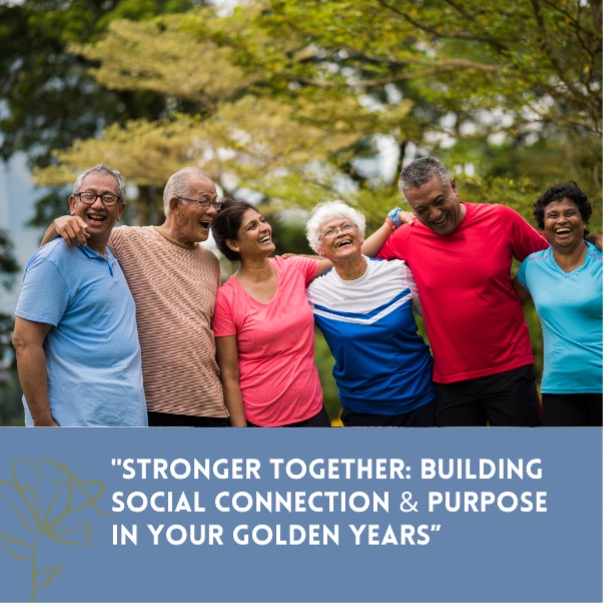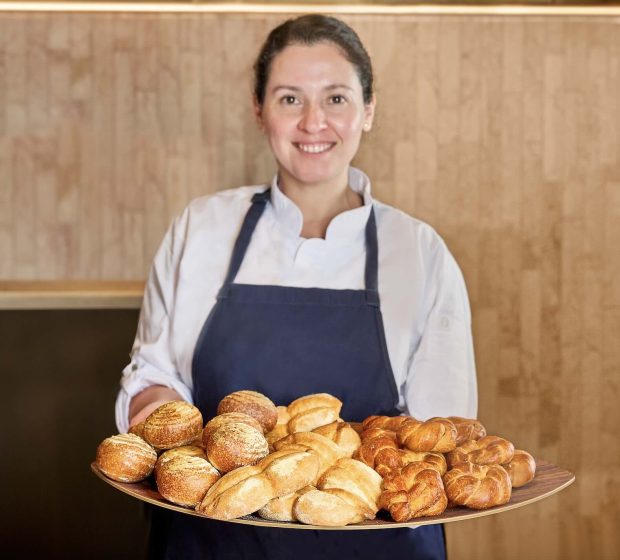Singapore boasts a rapidly growing silver population. While many can enjoy a comfortable retirement thanks to CPF savings, true well-being extends beyond food, fun, and pocket money. We need to understand the importance of a holistic approach. Here, we’ll delve into four key areas to ensure our seniors thrive, not just survive:
1. Social Connection and Purpose:
Singapore’s Senior Activity Network:
The Singaporean government actively supports senior social connections through a heavily subsidised eldercare and senior activity centres (SACs) network. These centres offer a welcoming environment for seniors to:
- Socialise: Participate in group activities, games, and events, fostering friendships and combating loneliness.
- Discover New Hobbies: Explore a variety of hobbies like art, music, gardening, or language classes, keeping minds active and engaged.
- Find peer support: Connect with like-minded individuals facing similar life stages, sharing experiences and offering emotional support.
Fostering Intergenerational Bonds
Beyond senior centres, Singapore encourages intergenerational interaction through programs like:
- Silver Volunteer Programmes: Seniors can share their wisdom and experience by mentoring youth or volunteering in schools and childcare centres. The mission creates a purpose and fosters meaningful connections with younger generations.
- Grandparent-Grandchild Programmes: Initiatives encouraging grandparents to engage with their grandchildren through storytelling, games, or shared hobbies can strengthen family bonds and provide a sense of belonging.
The Importance of Family Time
While government programs offer valuable support, a strong family network remains crucial. Encourage families to:
- Schedule Regular Visits: Carve out dedicated time for visits, meals, or outings with their senior loved ones. Showing care and concern combats isolation and provides opportunities for meaningful conversations.
- Plan Activities Together: Organise outings to familiar places, explore new parks or museums, or enjoy a movie night at home. Shared experiences create lasting memories and strengthen family bonds.
- Embrace the Reciprocity: Seniors have a wealth of experience and stories to share. Make time for active listening and appreciate their wisdom.
Continued Contribution through Work
Singapore recognises the value of senior expertise and actively promotes continued work:
- Senior-Friendly Work Arrangements: Government grants incentivise employers to offer flexible working hours, part-time opportunities, or modified duties to accommodate senior needs.
- Skills Upgradation Programs: Initiatives help seniors stay relevant by providing training in new technologies or soft skills, allowing them to re-enter the workforce confidently.
Combining government support, intergenerational interaction, strong family bonds, and continued work opportunities will ensure Singapore’s seniors have a fulfilling and purposeful later life.
2. Mental and Emotional Well-being
Prioritising Mental Health in Seniors
Singapore recognises the importance of mental and emotional well-being for our seniors. Here’s how we can address specific challenges and promote emotional health:
- Combating Feelings of Uselessness: Many seniors, especially those with limited mobility or retired from work, may struggle with feelings of uselessness. Encourage a shift in perspective. Highlight their ongoing contributions:
-
- Family: Grandparenting, sharing wisdom and experience, and providing emotional support to younger generations are invaluable contributions.
-
- Community: Volunteering their time and skills enriches and fosters a sense of purpose.
-
- Continued Learning: Learning new skills, hobbies, or languages keeps minds active and fosters a sense of accomplishment.
- Supporting Seniors with Disabilities: For some seniors, illness, handicap, or difficulty with technology can lead to frustration and social isolation. Here’s how we can support them:
-
- Accessibility Solutions: Advocate for accessible features like ramps, grab bars, and senior-friendly technology interfaces.
-
- Targeted Assistance Programs: Encourage the use of social service agencies and eldercare centres that offer specialised support for individuals with specific needs.
-
- Intergenerational Tech Buddies: Programs that pair tech-savvy youth with seniors can bridge the digital divide and empower them to navigate technology.
- Promoting Mental Health Awareness and Support:
It’s vital to normalise conversations about mental health and encourage seniors to seek help if needed.
- Look for Signs of Depression: Educate families and caregivers about the signs of depression in seniors, such as social withdrawal, changes in sleep or appetite, and feelings of hopelessness. Early intervention is crucial.
- Para-counsellors for Accessible Support: Singapore offers a network of para-counsellors who provide confidential emotional support and mental health education in community settings. These para-counsellors often speak multiple languages, making mental health services more accessible to diverse senior populations.
- Mental Health Screenings: Regular mental health screenings by healthcare professionals can help identify potential issues and ensure timely access to treatment, including therapy and medication if necessary.
By fostering a supportive environment, addressing feelings of uselessness, and offering accessible mental health resources, we can help our seniors maintain emotional well-being and navigate the challenges of ageing.
3. Technological Savvy: Empowering Seniors in a Digital Age
Technology can be a powerful tool for seniors, but overcoming resistance to change is vital. Here’s how we can bridge the digital divide and empower Singapore’s seniors to embrace technology:
Understanding Senior Concerns
It’s important to acknowledge the reasons behind seniors’ resistance to technology. Common concerns include:
- Fear of the Unknown: Unfamiliarity with new devices and software can be intimidating.
- Frustration with Learning Curves: Learning new skills can be frustrating, especially for those with limited experience.
- Physical Limitations: Vision or dexterity issues can make navigating technology challenging.
Strategies for Overcoming Resistance
- Family as Encouragement Partners: Families play a crucial role in encouraging seniors to embrace technology. Offer support and guidance during the learning process:
-
- Start Simple: Begin with basic skills like using a tablet for video calls or browsing the internet for familiar topics.
-
- Focus on Practical Benefits: Highlight how technology can improve their lives – connecting with loved ones, accessing healthcare resources, or online shopping for groceries.
-
- Celebrate Achievements: Acknowledge and celebrate their progress, no matter how small, to build confidence and motivation.
Making Technology Senior-Friendly
Singapore offers a wealth of resources to make technology more accessible for seniors:
- Subsidised Learning Programs: Government-funded programs like the Silver Infocomm Initiative (SII) offer heavily subsidised courses tailored specifically for seniors. These courses cover basic digital literacy skills, smartphone and tablet use, and safe online practices.
- Senior-Friendly Technology: Many devices and interfaces are designed with seniors in mind, featuring large fonts, voice commands, and simplified layouts to reduce complexity.
- Skills Future Credits: Singapore’s Skills Future Credit scheme can help seniors pay for approved technology training courses, making learning more financially accessible.
By acknowledging concerns, fostering a supportive learning environment, and leveraging available resources, we can empower Singapore’s seniors to embrace technology and enjoy its benefits. Technology can bridge geographical distances, connect them with loved ones, and provide access to a wealth of information and services, enriching their lives and fostering a sense of independence.
Regular Exercise and Physiotherapy Care: Optimising Mobility and Independence
While regular exercise is widely recognised for its benefits, physiotherapy remains an underutilised resource for Singapore’s senior population. It is often due to a need for more awareness about its potential to improve their quality of life.
Physiotherapy: Beyond Post-Surgical Rehabilitation
It’s important to understand that physiotherapists are often patients’ first point of contact after a doctor’s referral. They play a crucial role not just in post-surgical rehabilitation but also in pre-surgical preparation. Strengthening muscles and improving flexibility beforehand can significantly improve surgical outcomes and recovery times.
Both orthopaedic surgeons and the Ministry of Health Singapore highly recognise this expertise. While insurance coverage for physiotherapy varies depending on the plan and specific case, it’s often claimable on a case-by-case basis.
Benefits Beyond Surgery
The advantages of physiotherapy extend far beyond surgical procedures. Physiotherapy Singapore can significantly improve the lives of seniors experiencing:
- Chronic pain: Physiotherapists utilise manual therapy techniques, exercise programmes, and pain management strategies to alleviate chronic pain associated with conditions like arthritis or osteoporosis.
- Daily aches and pains: As we age, everyday activities can cause discomfort. Physiotherapists can design personalised exercise programs to improve strength, flexibility, and posture, reducing aches and pains and promoting overall well-being.
- Balance and gait issues: Falls are a significant concern for seniors. Physiotherapy focuses on improving balance and gait, reducing the risk of falls and promoting independence.
Making Exercise Accessible
Singapore offers a wealth of resources to encourage seniors to stay active:
- Health365 App: This free government app provides a library of exercise programs specifically designed for seniors, catering to various fitness levels and addressing common concerns.
- Community Exercise Programs: Many housing estates across Singapore host exercise programs for seniors in the mornings and evenings. These programs offer a social and motivating environment in which to stay active.
Combining regular exercise with personalised physiotherapy care can empower Singapore’s seniors to maintain their physical health, strength, and mobility. This allows them to live independently for longer, participate in activities they enjoy, and experience a heightened sense of well-being. Let’s work together to raise awareness about the transformative power of physiotherapy and encourage seniors to embrace a more active lifestyle.
A Fulfilling Journey for Singapore’s Seniors
Singapore boasts a vibrant senior population, and their well-being is paramount. As healthcare professionals, we understand that well-being goes beyond physical health. By focusing on social connection, mental and emotional health, technological savviness, a safe living environment, regular exercise, and readily available physiotherapy services, we can create a holistic approach to senior care.
The Singaporean government actively supports these efforts, offering a network of resources and programmes. However, family involvement remains crucial. By spending quality time with their loved ones, encouraging them to embrace technology, and advocating for their well-being, families can play a pivotal role in ensuring a fulfilling journey for Singapore’s seniors.
Let’s work together to empower our seniors to thrive, not just survive. Let’s celebrate their contributions, foster their independence, and ensure their golden years are filled with purpose, connection, and a sense of belonging.







